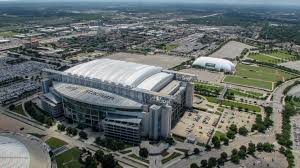HOUSTON, Texas — The Houston Texans are exploring the possibility of a new stadium, even as the city continues to make payments on the current NRG Stadium, a facility that has hosted the team since 2002. As the debate heats up, questions are being raised about the financial implications, the benefits to the city, and whether it is the right time for a massive infrastructure investment.
The Current Situation
NRG Stadium, located in the heart of Houston, has been home to the Texans for over two decades. Originally built as a replacement for the Astrodome, it was designed with modern amenities and a retractable roof, setting a high bar for sports venues in the state. However, while the stadium has served its purpose, there is growing concern about its age and whether it still meets the evolving needs of the franchise and its fans.
Despite ongoing payments for the stadium — which were originally structured as part of a public-private partnership — discussions surrounding a potential new facility have intensified in recent months. According to the Houston Chronicle, the Texans have been working with city officials and private developers to explore a range of options for a new stadium.
The current financial structure involves the city continuing to pay for the stadium through a combination of bonds, taxes, and revenue generated from the venue. While it remains a valuable asset to the city, the question arises: Is it financially viable to continue pouring funds into a facility that may soon be outdated? Or is it time to consider a new stadium that could attract more visitors and potentially boost Houston’s economy?
Economic Implications
The debate over a new stadium is not just a matter of sports; it’s about the city’s financial future. Houston’s commitment to NRG Stadium, which continues to receive upgrades and maintenance, has long been tied to a complex bond structure. The city still has payments remaining, which extend beyond the immediate future.
City officials have expressed concern about the added burden of taking on another stadium construction project. However, they have also recognized the potential economic boost a new facility could bring. According to the City of Houston’s official website, a new sports venue could generate millions in revenue from hosting large-scale events such as the Super Bowl, college football championship games, and major concerts. The tax revenue and job opportunities created by a modern stadium could significantly impact the local economy.
On the flip side, critics argue that the city’s focus should remain on paying off existing commitments and improving public infrastructure in other areas, such as education, transportation, and healthcare. Some believe that the financial pressure of paying for two stadiums could strain the city’s budget, especially given the competing priorities for public funds.
A Look at the Future
For the Texans, the appeal of a new stadium lies not just in the potential for more revenue but in attracting new fans and creating an iconic venue that will stand the test of time. With advancements in technology, sports stadiums have become more than just places to watch games; they are multifaceted entertainment hubs offering state-of-the-art facilities, restaurants, retail, and even tech-driven experiences.
Fans have voiced excitement at the prospect of a new home for the team. On social media platforms and sports blogs, many Texans supporters have shared their visions for what a new stadium could bring. From improved seating and concessions to larger video screens and high-tech fan engagement features, the demand for a modern sports venue is palpable.
In response, the Texans’ management has hinted at potential plans for an innovative stadium that will be equipped with the latest features to enhance the fan experience. While specifics remain vague, reports suggest that any new stadium would likely incorporate elements that reflect the city’s unique culture and history, while positioning the Texans as a major player in the evolving world of sports entertainment.
Challenges and Public Opinion
However, not all Houstonians are on board with the idea of a new stadium. Public opinion remains divided on the issue, with some expressing concerns about the costs involved and the potential for increased taxes. Houston has faced significant financial challenges in the past, and many citizens are wary of taking on additional debt for a project that, while promising, may not provide immediate benefits to all residents.
The local government has acknowledged these concerns and emphasized that any new stadium proposal would undergo thorough analysis, including community feedback and financial impact studies. Mayor Sylvester Turner has reiterated that any decisions made will prioritize the long-term well-being of the city and its residents.
Additionally, the Texans’ leadership is aware that they must carefully navigate this process. The franchise has enjoyed considerable success on the field, but it also recognizes the need to balance financial interests with public sentiment. As part of this, they have pledged to maintain transparency in discussions and ensure that any potential stadium project would be beneficial to the entire community.
Conclusion: A Decision Looms
As the debate over a new stadium continues to unfold, the future of the Texans’ home remains uncertain. While the franchise is eager to explore new possibilities, Houston’s citizens and leaders are carefully weighing the financial ramifications and broader implications of such a move. The coming months will likely see further discussions, studies, and public forums as the city and the Texans look to make a decision that will shape the city’s sports landscape for generations to come.
Whether the Texans stay at NRG Stadium for the long haul or transition to a new, state-of-the-art venue, one thing is clear: the future of sports in Houston is anything but predictable. With both financial and emotional investments on the line, the city must balance ambition with caution as it plans for the next chapter in its storied sports history.
For more on Houston’s stadium developments, visit the City of Houston’s website and stay tuned for updates on this unfolding story.
Disclaimer – Our team has carefully fact-checked this article to make sure it’s accurate and free from any misinformation. We’re dedicated to keeping our content honest and reliable for our readers.




